Vinyl records have experienced a remarkable resurgence in recent years, capturing the hearts of music enthusiasts with their tactile appeal and warm sound. However, it is essential to consider that vinyl records also come with certain drawbacks. In this article, we delve into the disadvantages of vinyl records to provide a balanced perspective for both avid collectors and casual listeners.
- Fragility and Sensitivity: One significant drawback of vinyl records is their fragility and sensitivity to physical damage. Unlike digital music formats, vinyl records are susceptible to scratches, warping, and other forms of physical degradation. Mishandling or improper storage can lead to irreparable damage, impacting the sound quality and overall playability of the record.
- Limited Lifespan: Vinyl records have a limited lifespan compared to digital formats. Continuous playback and repeated needle contact gradually wear down the grooves, resulting in a gradual degradation of sound quality over time. While proper care and maintenance can extend their lifespan, it is inevitable that even well-preserved records will eventually exhibit signs of wear.
- Inconvenience and Portability: Vinyl records are not as convenient or portable as digital music. They require a dedicated turntable and audio setup for playback, which can be bulky and costly to acquire. Additionally, vinyl records are not suitable for on-the-go listening or easily transported like digital music files or streaming services.
- Background Noise and Imperfections: Vinyl records are prone to background noise and imperfections during playback. Surface noise, pops, and clicks can be present, especially on older or heavily used records. While some argue that these imperfections contribute to the unique charm of vinyl, they can be a distraction for those seeking pristine audio quality.
- Limited Availability and Rarity: Certain albums or specific pressings of vinyl records can be challenging to find or exceptionally rare, leading to inflated prices in the collector’s market. This limited availability may make it difficult for enthusiasts to acquire their desired records without paying high premiums.
- High Costs: Vinyl records can be relatively expensive compared to digital music formats or streaming services. New vinyl releases, limited editions, or rare records often come with higher price tags. Additionally, investing in high-quality audio equipment, such as turntables and speakers, can add to the overall cost of enjoying vinyl records.
While vinyl records offer a unique listening experience and evoke a sense of nostalgia, they are not without their disadvantages. Fragility, limited lifespan, inconvenience, background noise, limited availability, and higher costs are all factors that potential vinyl enthusiasts should consider. However, for many passionate music lovers, these trade-offs are outweighed by the tactile experience, warm sound, and connection to the music that vinyl records provide. Ultimately, the decision to embrace vinyl records should be based on personal preferences and the value placed on the unique qualities they offer.


